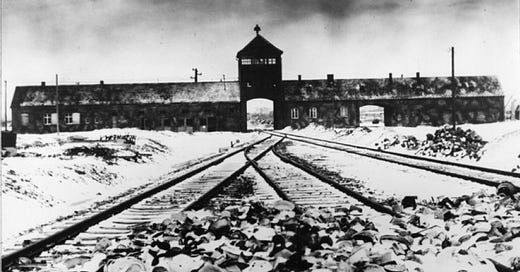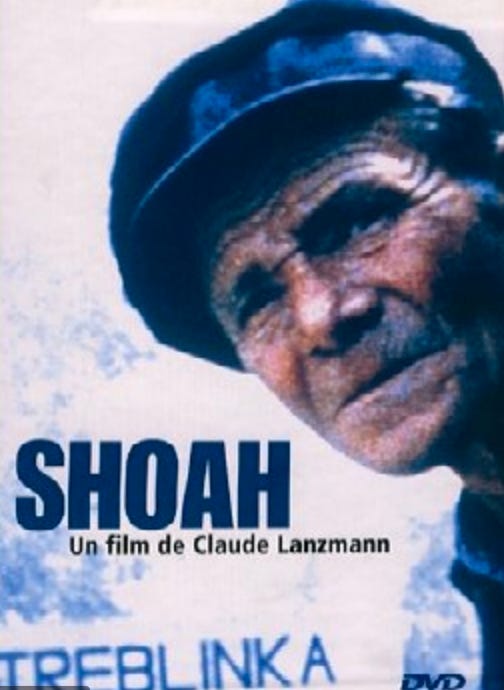What were you doing five years ago? Take a second and think. It’s really not a very long time.
Five years before I was born Auschwitz was still in operation. That is how close in time this ultimate calamity is to me and all those born in the afterglow of the defeat of Nazism.
Although the Holocaust took place all over Europe, it is Auschwitz in Poland that is considered the epicenter. More Jews were killed there than anywhere else and it is better preserved than the other places of mass murder.
Importantly it was the place where Jews from Western Europe were transported in large number. By the time Auschwitz-Birkenau (the picture is of the Gates of Hell entry to Birkenau. It is over the road from Auschwitz, which was set up as a labor camp with the sign: Arbeit Macht Frei) most of the Jews of Eastern Europe, of Poland and Ukraine and the Baltic states were dead. Most Poles were gassed at Treblinka, the others died in the Holocaust of bullets at places like Babi Yar and in Pobych, the village where my grandmother lived until she was ten. In Pobych no one survived. The women were deported to Bełzec to be gassed and the men worked as slave laborers until one day they were marched into a nearby copse of trees and shot.
It was the inefficiency of the Holocaust of bullets that led to the Wannsee conference, and the mass deportations to Auschwitz. In a neat bit of symmetry the Wannsee conference was held precisely three years before the Red Army liberated the camp.
Do you have a sense of how long three years is?
In 1995 NPR sent me to Auschwitz to cover the 50th anniversary of the liberation of the camp by the Red Army. I interviewed Elie Wiesel and recorded prayers being sung on the ruins of Crematorium II. It was a kind of religious experience and you can listen to the voice of the late Elie Wiesel in this FRDH, First Rough Draft of History, podcast.
Most of the time the Holocaust resides in the area of my brain between the conscious and the sub-conscious. If you are Jewish it becomes part of your identity, but it is only one facet of who you are. I acknowledge this part of myself through my work.
I’ve done some reporting from Poland and Ukraine on the phenomenon of anti-Semitism without Jews. I am in touch with people who are consumed still with seeking justice in the form of acknowledgement of the crimes committed by ordinary citizens of Lithuania, Latvia, and Estonia.
When I encounter egregious anti-Zionism, I ask the speaker the question with which I started this post: What were you doing five years ago? I give the same answer: five years before I was born Auschwitz, Belsen, Dachau were all in operation.
But for some reason, recently the Holocaust has crawled out of the grey zone and planted itself in the forefront of my waking consciousness.
I was in the US for the week surrounding Election Day and when I flew back to London a new and more strict Covid lockdown had been put in place (not strict enough, as it turns out). The nights were drawing in. The early evening darkness on the way to the winter solstice always seems blacker than the evening darkness as we move towards spring.
I signed up for the BFI’s streaming service and for some reason I started watching Shoah again. I had seen it when it came out in the mid-80s, all nine plus hours of it. It was a major cinema event of the time. If you considered yourself cultured you had to see it. Having done so I figured I would never watch it again. But now something motivated me to look at it again.
I watched Shoah in 15-20 minute chunks, usually around 6 p.m., the dead zone of my day, between work’s end and preparing and sitting down to the evening meal. It took several weeks to get through the film. It became a bit of a joke around my house: Dad’s watching the Holocaust again.
Shoah should have been enough but then I felt a compulsion to re-watch Roberto Rosselini’s Rome: Open City, about the Italian resistance to the Nazis in the last days of the war. Then I watched Jean-Pierre Melville’s Army of Shadows, a film about the French Resistance - of which he was a member.
Both are tense, sombre pieces. They are studies of heroism without any swelling major chords. They show the reality of heroism when your country is taken over by fascism and you have to physically fight using whatever tactics you must: dirty, dangerous and morally ambiguous.
It took a little while before I understood why my sub-conscious compelled me to watch these films. In the real world, Donald Trump and the majority of the Republican faction and Republican supporting media were trying to overturn the Presidential election results.
It didn’t matter that I knew they would fail because they really are inept. It was the fact that they even tried at all. Part of knowing about the Holocaust is knowing how it happened. How the Nazis came to power in 1933, after years of subverting constitutional and democratic norms, and slowly strangled Jewish life in Germany with the acquiescence of most Germans. This culminated in Kristallnacht in 1938. If you hadn’t got out by then - more than half of Germany’s Jews emigrated between these two events - you had very little chance of survival.
Five years from Hitler coming to power —and opening Dachau the same month— to Kristallnacht. Five years from the liberation of Auschwitz to my birth.
Given the forces brought to the surface by the Republican faction’s behavior in the months between the election and the Capitol riot, What will America be like five years from now?
Five years really isn’t such a long time.
If you want to hear more sound content, please visit the FRDH podcast website or look it up on soundcloud.





